|
Lincoln Heritage Museum Pearl
Harbor Day observance shares
"stories that need to be
passed down so that we as a nation can grow, learn, and truly, truly
appreciate the sacrifices that were given before us.”
 Send a link to a friend
Send a link to a friend
 [December 09, 2017] [December 09, 2017]
LINCOLN
On the
76th anniversary of the bombing of Pearl Harbor, the Lincoln
Heritage Museum at Lincoln College hosted its second annual
observance service in the atrium at Lincoln Center.
A number of guests were on hand including Illinois Representative
Tim Butler, several city and county representatives, veterans and
other members of the community.

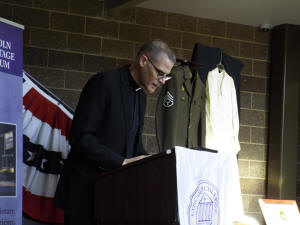
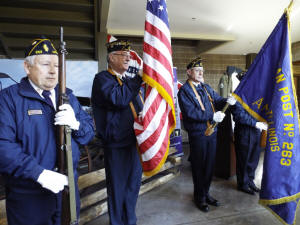

The day
began with welcoming remarks by Museum Administrator Tom McLaughlin
and an opening prayer by Father Jeffrey Laible of Holy Family
Church, who is also a chaplain for the Illinois National Guard. The
presentation of the colors was performed by the American Legion
Color Guard while Lincoln College vocal major, Dajuan Stewart Jr.
sang the National Anthem.

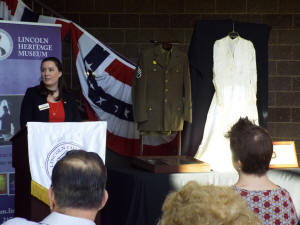
The
guest speaker for the day was the museum Assistant Director Anne
Moseley. She shared with guests the story of her grandparents, Byron
and Rosemary Lochridge, whose lives were greatly impacted by the
bombing of Pearl Harbor.
Byron and Rosemary were a young couple engaged to be married when
the Japanese invaded United States territory and destroyed the
Hawaiian port Pearl Harbor. The couple was planning to be married in
the future, but Mosely noted planning a wedding takes time, and due
to Pearl Harbor her grandmother and grandfather soon learned that
time was something they did not have.
Moseley said her grandfather had just finished college with a degree
in microbiology. He and Rosemary had been engaged in the summer of
1941. Word that unrest was growing in Europe led Byron to enlist in
the United States Army.
On December 7th, 1941, the Japanese bombed Pearl Harbor and Byron
and Rosemary had to put their big plans aside and settle for
something much smaller and much quicker. Byron received orders that
he would ship out of Little Rock, Arkansas to Hawaii on December
19th. A big family wedding became a small affair where Byron was
stationed.
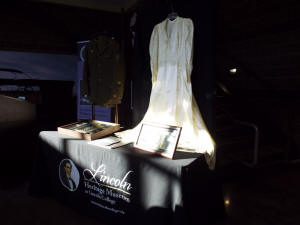
Moseley
pointed out the wedding dress that was on display where she spoke.
She said that the hand sewn garment was completed in the car on the
drive to base by Rosemary’s mother and mother-in-law. The car was
being driven by Rosemary’s brother who had helped to quickly get his
sister ready for the trip. Mosely noted that as is the case with
many brothers, some details were missed, including grabbing up the
shoes Rosemary would wear with her gown as they all left home.
Mosely said consequently Rosemary married her husband wearing her
house slippers.
That wedding missed some of the key components of a well-planned
wedding, no photographer, no flowers, no theme colors, and no
honeymoon.

The couple were given only a few hours together as husband and wife,
as Byron left the next morning and Rosemary was left behind.
While Byron served overseas, his state-side home base changed from
time to time and each time Rosemary would move to a new base and
await the return of her husband. Mosely said the only thing her
grandmother had were the letters that her grandfather wrote to her
on a very regular basis. Each letter was cherished and carefully
stored away as a remembrance of that chapter of the couple's life
together.
Mosely said it was important to note that it was not just the
soldiers who were impacted by the war but also their wives and
families. Young wives were left behind to live alone and take care
of themselves with little known about where their husbands were or
when they might be able to come home. Young mothers were raising
children alone with no father figure to play a part in their growth.
While stationed in Oregon, Rosemary began a small business, making
baby clothes and helping young mothers on the base. She said for
Rosemary, it was a way to provide love, hope, and care for young
mothers and children who were left behind as a result of Pearl
Harbor.
Mosely said her grandfather was proud to serve his country. For him
it was a moral obligation, and a feeling shared by many young men
during World War II. But she said it was also an obligation for the
wives they left behind, and they too respected and honored that
moral obligation.
Moseley said that the letters that kept her grandmother close to her
husband were put away when the war ended. Byron returned home, and
the couple began to build their life together. Byron didn’t speak of
the war to anyone, and the reminders of war such as his uniform were
stored away, out of sight.

[to top of second column] |


With
this being a very personal story, Moseley hesitated briefly as she
entered the next portion of her account. She recalled in the 1990’s
being a child with a curious mind, she went to her grandfather and
asked him to tell her about the war. He did. For the first time in
his life, he talked about the tragic things he saw and the
devastation. But also the stories came out about the young
couple. The wedding dress was brought out and the stories told, and
the uniform was pulled from the back of the closet and put on for
the girl to see.
She said the pride and respect for country was something her
grandfather maintained throughout his life. He was the first to
stand at the sight of his flag and when the National Anthem was
sung. And even when he was physically unable to stand in his later
years, he would reverently place his hand upon his heart at all
patriotic occasions.

After that war, life did go on for the Lochridges. They raised a
family, all girls, who also had families, giving the Lochridge’s
grandchildren to love and enjoy.
The couple lived their civilian life in one home. They moved into
the home after they returned from the service, and remained there
until they had to be placed in extended care. Mosely said that after
her grandfather told her his story, her grandmother also shared
stories, but the stories became more complete when the family
cleaned the home after her grandparents were gone.
Mosely said among the treasures they found was the box of letters
her grandfather had written to her grandmother. In that box there
were also photos that Byron had sent to Rosemary, pictures of
himself, pictures of his military buddies, and more.
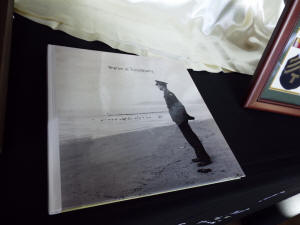

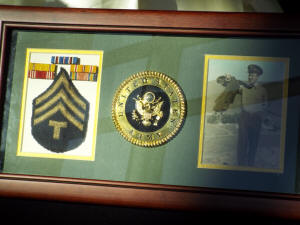

The
collection was organized and put into a keepsake book that Mosely
had on display along with a small shadow box of memories, a photo of
Bryon and his Military Stripes, one of his two uniforms (he was
buried in the other) and Rosemary’s wedding dress.

Mosely said the take away from her story was that all veteran’s need
to share their stories. “Those are stories we need to know, stories
that need to be passed down so that we as a nation can grow, learn,
and truly, truly appreciate the sacrifices that were given before
us.”
After Moseley finished, Dr. David Gerlach, President of Lincoln
College, spoke briefly. He acknowledged the presence of
Representative Butler and also his “favorite” World War II veteran,
Bill Gossett.
Gerlach said his connection to World War II was through his
grandparents Albert and Margret Gerlach who served in the Civil
Defense Corp in New Jersey leading area drills, blackout patrols,
recycling and rationing efforts soon after the attacks on Pearl
Harbor.
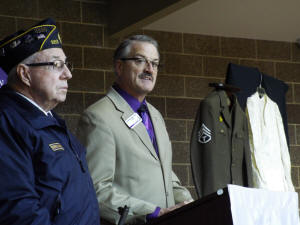
Gerlach
then read excerpts for the historical accounts of World War II:
“The base was
attacked by 353 Japanese fighter planes, bombers, and torpedo planes
in two waves, launched from six aircraft carriers. All eight U.S.
Navy battleships were damaged, with four being sunk. All but one
(Arizona) were later raised, and six of the eight battleships were
returned to service and went on to fight in the war. The Japanese
also sank or damaged three cruisers, three destroyers, an
anti-aircraft training ship, and one minelayer. One hundred and
eighty eight U.S. aircraft were destroyed; 2,403 Americans were
killed and 1,178 others were wounded.
“The attack came as a profound shock to the American people and led
directly to the American entry into World War II in both the Pacific
and European theaters. The following day, December 8, the United
States declared war on Japan.”

Gerlach finished with a notation about President Roosevelt, who
tagged the day as "a date which will live in infamy".
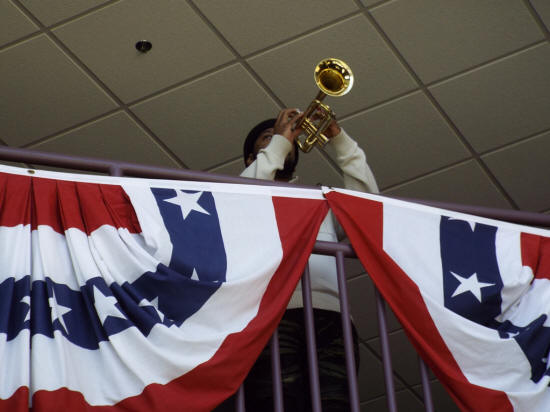

Immediately following this Lincoln College Jazz Studies student
Jalen Fields played Taps as the color guard retired the colors.
McLaughlin ended the day by thanking those who had participated and
those who had attended and extending an invitation for everyone to
come in and tour the first floor of the Lincoln Heritage Museum.
[Nila Smith] |